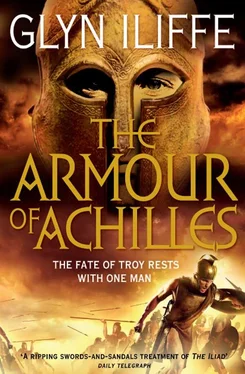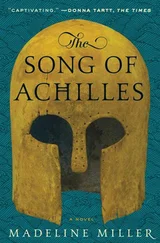Glyn Iliffe - The Armour of Achilles
Здесь есть возможность читать онлайн «Glyn Iliffe - The Armour of Achilles» весь текст электронной книги совершенно бесплатно (целиком полную версию без сокращений). В некоторых случаях можно слушать аудио, скачать через торрент в формате fb2 и присутствует краткое содержание. Год выпуска: 0101, ISBN: 0101, Издательство: Pan Books, Жанр: Старинная литература, на английском языке. Описание произведения, (предисловие) а так же отзывы посетителей доступны на портале библиотеки ЛибКат.
- Название:The Armour of Achilles
- Автор:
- Издательство:Pan Books
- Жанр:
- Год:0101
- ISBN:9781447205098
- Рейтинг книги:4 / 5. Голосов: 1
-
Избранное:Добавить в избранное
- Отзывы:
-
Ваша оценка:
- 80
- 1
- 2
- 3
- 4
- 5
The Armour of Achilles: краткое содержание, описание и аннотация
Предлагаем к чтению аннотацию, описание, краткое содержание или предисловие (зависит от того, что написал сам автор книги «The Armour of Achilles»). Если вы не нашли необходимую информацию о книге — напишите в комментариях, мы постараемся отыскать её.
The Armour of Achilles — читать онлайн бесплатно полную книгу (весь текст) целиком
Ниже представлен текст книги, разбитый по страницам. Система сохранения места последней прочитанной страницы, позволяет с удобством читать онлайн бесплатно книгу «The Armour of Achilles», без необходимости каждый раз заново искать на чём Вы остановились. Поставьте закладку, и сможете в любой момент перейти на страницу, на которой закончили чтение.
Интервал:
Закладка:
‘And now that spring has returned, the sacrifices of previous years need to be replaced,’ Penelope said, ‘hence your journey back to Ithaca with skeleton crews.’
Arceisius nodded. ‘Things have got bad. The longer the war goes on, the more bitter and brutal it gets. We used to be able to exchange our prisoners with the Trojans, but that was when both sides still had a sense of honour. Now most are murdered, unless they’re rich enough to fetch a ransom. The toll of war is growing and Odysseus hasn’t enough wealth to attract mercenaries to replace our dead – not when the other kings will offer them more. So we need to take as many men back with us as we can fit. The king wants them to be picked in equal proportion from the nobility and the peasantry.’
Penelope sighed. ‘There are problems with that.’
‘Yes,’ Mentor agreed. ‘Bandit raids from the mainland are becoming more common, and some of our own nobles are starting to show signs of disloyalty, especially with Odysseus having been away so long. We have to keep a standing force of soldiers.’
‘Nonetheless, Odysseus will have his men,’ Halitherses countered. ‘We can take care of the problems here; just let us know how many the king needs.’
‘The problem isn’t how many men we can provide,’ Penelope said, sitting upright and looking at her two advisers. ‘It’s with whom we send.’
The others looked at her, not understanding.
‘What do you mean, my lady?’ Eurybates asked.
‘I mean there are certain nobles who are not happy about sending their sons and heirs to Troy. They know why you’re here, of course, and they want to be allowed to send proxies in place of their own sons – in other words, pay another man to go to war instead.’
Halitherses snorted derisively.
‘Well, they can’t. In fact, I’ve a good mind to send the sons of the most troublesome nobles first.’
‘Perhaps that’s what they fear,’ Penelope replied. ‘Either way, Eupeithes approached me earlier today pleading their case. He says the nobles are angry and if their sons are chosen we could have a rebellion on our hands, but if we agree to allow paid proxies he might be able to calm things down again.’
‘How dare they!’ Halitherses exclaimed.
The others exchanged worried glances.
‘So I agreed.’
‘But my lady—’
‘No, Mentor. It’s too late. I’ve asked Eupeithes to tell the nobles I accept their proposal. The war in Troy can’t last much longer, and I won’t risk a rebellion on Ithaca while Odysseus is away. That has happened before, remember?’
Mentor nodded, followed by Arceisius and Eurybates as each one accepted the wisdom of her decision. At first Halitherses stared at the queen with a blank look on his face. Then a smile broke through his grey beard as he recalled the oracle that had been given to Odysseus before he had married Penelope.
‘ “Find a daughter of Lacedaemon”,’ he quoted, laughing to himself, ‘ “and she will keep the thieves from your house.” Now, more than ever, I understand the words of that old prophecy. Odysseus would be proud of you, my lady.’
‘He should be,’ Penelope replied. ‘Just as I am proud of him. And now, Arceisius, you can tell me about my husband, and Telemachus here about his father. Ten years is a long time to be apart, and yet he’s never far from my thoughts. He feels like a shadow, something ever present and yet insubstantial, always just beyond my reach.’
She sat back and shook her head, knowing her words had failed to express how she felt. And then she looked directly at Arceisius, silently awaiting his response.
‘He made me memorize a few words, my lady,’ he said. ‘I can’t match his voice or speak with his eloquence, but he said to tell you this: that the Walls of Troy will not outlast his love for you. An oracle led him to you, and though all the oceans of the world and Hades itself might lie between, he will come back to you.’
Chapter One
L YRNESSUS
Eperitus licked his pale lips, feeling the old lines where they had cracked again and again under a ruthless foreign sun. Ten years of that same sun had given his skin a leathery texture so that when he smiled, which was not often, his teeth were white against his deeply tanned face. With his braided beard and long black hair – combed tightly back and tied behind his neck – he looked more like a savage than the handsome man he had once been. And perhaps he was a savage, for the only trade he had ever known was fighting and there was little humanity in war.
His thoughtful brown eyes, red around the rims and creased at the corners, were fixed on the ridge ahead, waiting patiently for the next battle to begin. The accoutrements of his profession had been strapped and buckled into place long before dawn, each item as familiar and comfortable as if they were parts of his body. On his head was the same bronze cap he had worn since before his exile from Alybas twenty years before. Its battered cheek-guards were tied under his chin by leather cords, which he had tucked into his dirty woollen scarf to prevent them becoming untied in battle. Over his patched thigh-length tunic – once a vivid scarlet but now faded to a watery pink – was a close-fitting, oxhide corslet that bore the scars of countless hand-to-hand combats. Bronze greaves tied about cloth gaiters protected his shins, while hanging from a strap across his shoulder was his grandfather’s old shield. This was almost as tall as Eperitus himself and was shaped like two overlapping, convex circles – the broader at the bottom and the smaller on top – with a raised wooden crest running down the centre. Though the shield’s four-fold leather had been hacked and pierced innumerable times, and it was of an old and cumbersome style that had long since faded from battlefields, Eperitus refused to replace it, considering it as much a part of himself as his own name.
While his shabby collection of armour had saved him from the spear points and sword blades of countless enemies over the years, it was his weapons that were the tools of his trade. Tucked into his belt was the ornate golden dagger King Odysseus had given him as a token of friendship when they had first met. In a plain leather scabbard under his left arm was his double-edged sword, slung at a height where its silver-studded ivory handle could be found and drawn with ease. Finally, in his right hand was his primary weapon, a tall Trojan spear which he had plundered from its dead owner during a skirmish the previous summer, his own having been launched at a horseman whose mount had then fled, carrying its impaled rider and Eperitus’s spear with it. Without these heavy and brutal weapons he was not a warrior, and if he was not a warrior then he was nothing, a mere mortal without reputation or honour who would one day perish and be forgotten.
To Eperitus’s right stood Odysseus, king of Ithaca, the man he had followed to this sun-baked, mosquito-infested and scorpion-plagued country. With his short legs, heavily muscled torso and large head – almost devoid of a neck – Odysseus could never be considered a fine-looking man. His long red hair was tied behind his neck and his thick beard, flecked with grey, reached down to his chest. Like Eperitus, there was a tang of fresh sweat about him, mingled with the odour of wood smoke and roast mutton. His breastplate and shield were battered and dusty, while his bronze helmet with its nodding plume of black horsehair had been dented in so many places that its surface rippled in the early morning sunshine. Over his shoulders he wore the thick double-cloak his wife had given him at their parting ten years before. It was threadbare and heavily patched, and the purple wool had faded to a silvery grey at the shoulders, but he would no more replace it than Eperitus would his grandfather’s shield. It was all he had left of his beloved Penelope, whose vivid intelligence and bright company he still missed with all his heart, even though her beautiful face was little more than a memory now.
Читать дальшеИнтервал:
Закладка:
Похожие книги на «The Armour of Achilles»
Представляем Вашему вниманию похожие книги на «The Armour of Achilles» списком для выбора. Мы отобрали схожую по названию и смыслу литературу в надежде предоставить читателям больше вариантов отыскать новые, интересные, ещё непрочитанные произведения.
Обсуждение, отзывы о книге «The Armour of Achilles» и просто собственные мнения читателей. Оставьте ваши комментарии, напишите, что Вы думаете о произведении, его смысле или главных героях. Укажите что конкретно понравилось, а что нет, и почему Вы так считаете.












